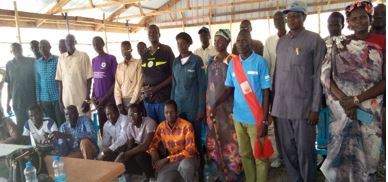The Women Advancement Organization (WAO), a National Non-Governmental Organization in South Sudan, has developed mechanisms to fight and mitigate gender-based violence (GBV) and help survivors get justice and psychological support.
In a statement extended to this publication, the organization said that through a partnership with a Norwegian People’s Aid (NPA) funded project, they have reached thousands of women, girls, youths, and men in locations of Central Equatoria State’s Juba County like Gondokoro Island, Lemon Gaba and Old Fangak targeting especially GBV survivors at the grassroots to access justice.
“Our objective as a GBV Response Partner of NPA is to create a wide network of players from different project activities to protect women and girls against and fight gender-based violence. We see the support from NPA as a catalyst that amplifies our voices in the fight to end gender inequality and create social cohesion,” the statement read in part. “WAO’s interventions have been through documenting and recording cases related to GBV and violations and offering psychosocial support to the survivors through health centers, police units, customary courts, and payam chiefs.”
“WAO also provides pro-bono legal and psychosocial services to GBV survivors and people whose rights have been violated through trauma counseling and legal aid by paying police/court fees, legal fees, representation of survivors in customary courts, and referrals of certain cases to the High Court,” it added.
The organization also offers local transport to help GBV survivors report and follow up cases at police stations and courts, psychosocial support, and organizes dialogues to influence local authorities on laws and policies affecting women’s rights, especially with women, men, local chiefs, customary court authorities, commissioners, traditional leaders, and police.
“WAO also organizes campaigns and meetings to sensitize communities on gender discrimination and women’s rights, early and forced marriages, GBV, and women’s right to own land and property. In these meetings, we target youth, women, local authorities, men, customary and statutory courts, and state and local government authorities among others,” the WAO statement stated. “We train and skill GBV survivors to empower them economically to provide for their families and children. We also occasionally organize radio talk shows on different topics affecting women to create awareness.”




